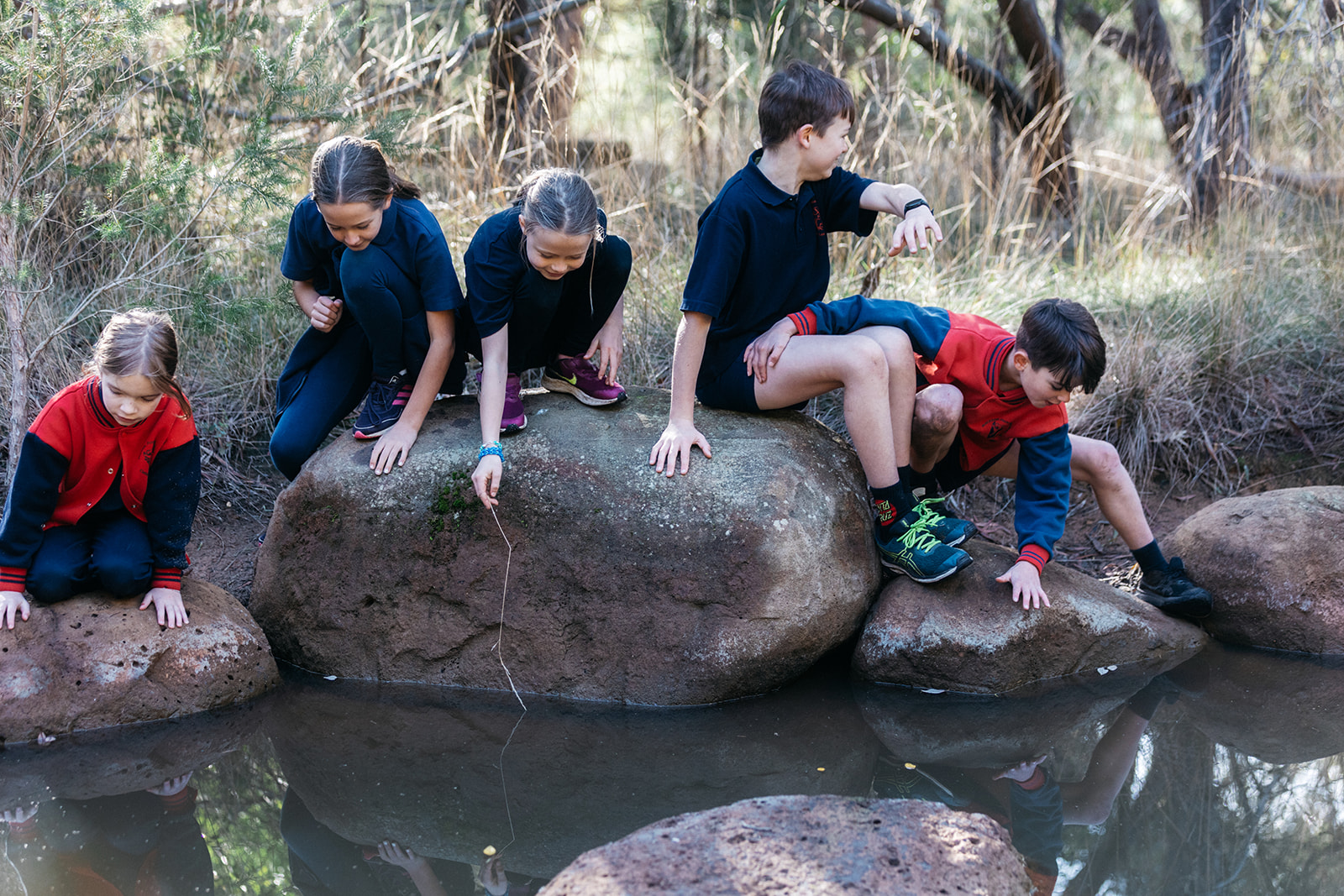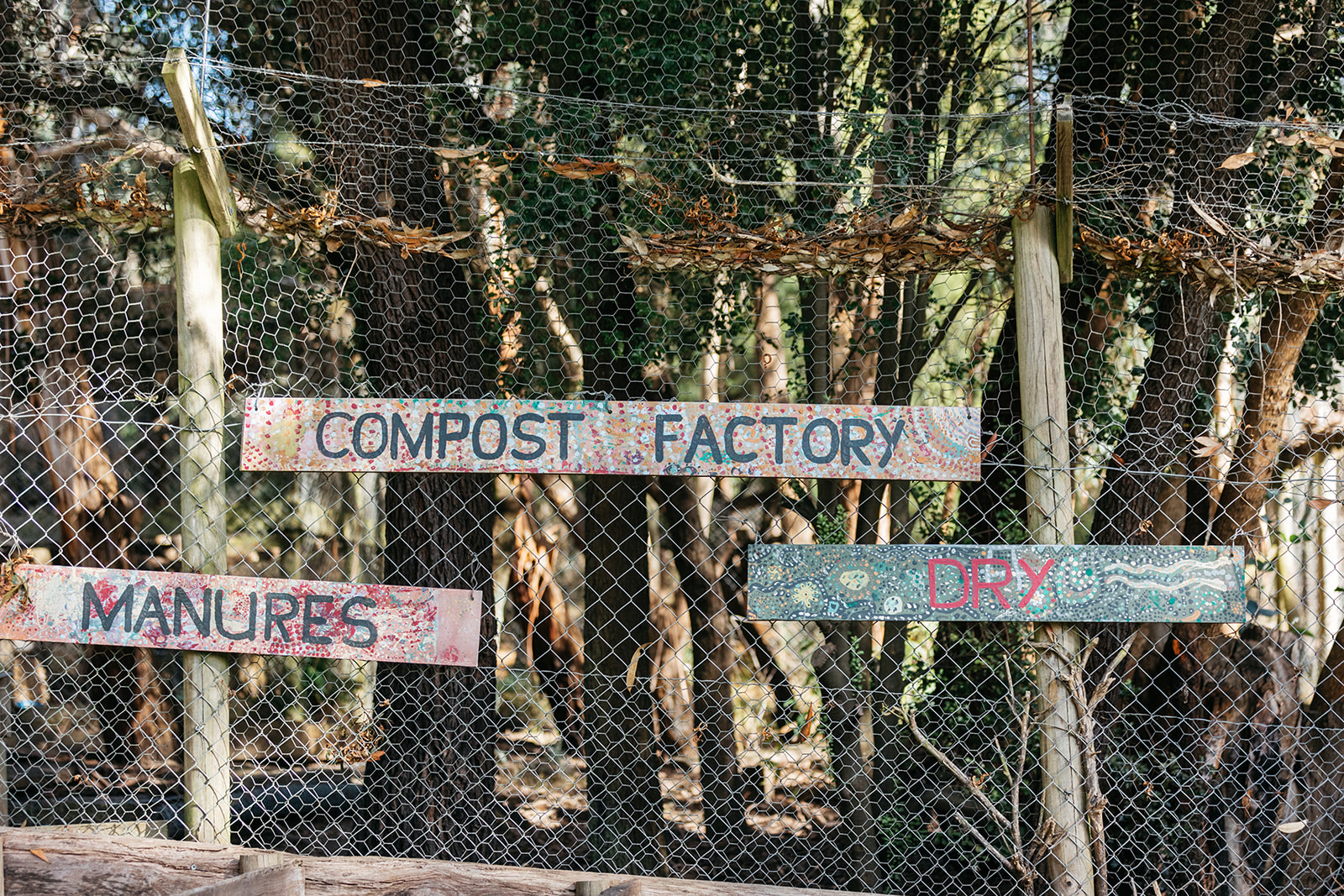Curriculum
English/Literacy
At Macedon Primary School the focus of the English Program is to develop deep understanding and competent skills in our students in the strand of Reading/Viewing, Writing, Speaking and Listening. Macedon Primary School implements the Victorian Curriculum F-6. The 3 strands of the English Curriculum are:- Language, Literature and Literacy.
Strengths of our English Program are:
- A daily literacy block
- Additional literacy support through the MiniLit SAGE and MacqLit programs which complement the classroom literacy program for targeted students in need.
- Parental involvement in classroom literacy programs which fosters a positive teacher and parent partnership
- Consistent delivery of agreed instructional models in Literacy
- Development of individual student reading and writing goals
- Ongoing professional development for staff
Reading Program
Foundation -Year 2
Initialit
InitiaLit is an evidence-based whole-class literacy program providing all children with the essential core knowledge and strong foundations to become successful readers and writers. InitiaLit is a three-year program, covering the first three years of school (Foundation to Year 2).
Foundation
InitiaLit–F focuses on two main components:
- Phonics, to systematically and explicitly teach the basic alphabetic code in a set sequence. In addition to learning letter-sound correspondences and how these are applied to reading and spelling, children will be introduced to common morphemes and simple grammatical concepts.
- Vocabulary, oral language and listening comprehension through quality children’s literature. Detailed lessons, including writing tasks, are provided for each of the storybook titles selected for use with the program.
Year 1
As in InitiaLit–F, InitiaLit–1 focuses on the two main components of:
- Phonics, to systematically and explicitly teach the basic and advanced alphabetic code in a set sequence. In addition to learning letter-sound correspondences and how these are applied to reading and spelling, children will be introduced to common morphemes and simple grammatical concepts.
- Vocabulary, oral language and listening comprehension through quality children’s literature. Detailed lessons, including writing tasks, are provided for each of the storybook titles selected for use with the program.
Year 2
By Year 2, most children will be well on their way to reading independence. The program builds on the skills taught in InitiaLit–F and InitiaLit–1, with the focus shifting now to consolidating children’s reading and spelling skills, working specifically on reading comprehension, fluency, spelling and vocabulary.
InitiaLit–2 has four main components:
- Spelling. This component reviews phoneme-grapheme correspondences and spelling concepts taught in InitiaLit–1 and teaches the remainder of the advanced alphabetic code systematically and explicitly. Children will also learn new spelling rules and morphological concepts.
- Reading comprehension and fluency. In this component, children will be taught comprehension strategies explicitly and how to apply them to different types of text. They will also be given regular opportunities to work on reading fluency through echo, choral and paired reading.
- Grammar. Children will be explicitly taught key grammatical features and how to apply them to a writing task.
4. Vocabulary, oral language and comprehension through children’s literature. Detailed lessons are provided for each of the 15 storybook titles selected for use with the program, including detailed writing tasks. Two novel studies are included for use towards the end of the year.
Years 3 - 6
By year 3, the reading program follows a tight instructional model. Students participate in daily independent reading, where selected students partake in reading conferences with their teacher and a negotiated reading goal is discussed and agreed upon with the student. While the teacher conducts the reading conference the remainder of the students are reading a ‘just right’ book with a particular focus during their reading. Explicit teaching and modelling of reading strategies is a significant part of the model. Comprehension strategies are explicitly taught and modelled in the mini lesson. Children are then given opportunities to practise these during guided, independent reading and authentic reading tasks. Teachers differentiate literacy tasks to cater for all students by carefully assessing their students using a range of assessments. Developing students into independent, engaged and successful readers who self-monitor, question and make connections to the text is our primary goal.

Speaking and Listening
Speaking and listening is embedded not only in the Literacy block but in all other curriculum areas. Children learn to communicate effectively and develop their oral language skills within and outside the classroom. Students participate in small and whole class discussions, guided reading, formal and informal presentations and in ‘turn and talk’ to share their thinking. From Foundation, our students are given opportunities to practise their speaking skills at our whole school assemblies. All our senior students are given a leading role at these assemblies presenting awards and announcements to the community on a weekly basis.

Writing
At Macedon Primary School we focus on teaching our students to become fluent, efficient and creative writers. Throughout the week students engage with a range of learning experiences to strengthen their writing skills such as:
- Sentence level work, to develop the foundations of writing
- Explicit teaching of spelling
- · Grammar and word study
- Genre writing sessions, to develop the structure and different expectations of text types e.g. narratives and persuasive
- Handwriting and typing
- Editing practices
In addition, staff enthusiastically teach figurative language. Students are explicitly taught writing strategies and devices. Our students learn about similes, metaphors, power of 3, onomatopoeia and a range of figurative language commencing in Foundation. The children are taught how writing strategies and figurative language can be incorporated in all text types and by using these it brings out a strong writer’s voice.

Literacy Intervention
At Macedon Primary students who require reading intervention are targeted at the beginning of year 1 and participate in the MiniLit Sage program. The program provides explicit instruction in phonemic awareness, systematic synthetic phonics for reading and spelling, letter formation, and connected text reading. The program is led by our Tutor in Schools teacher and supported by a passionate team of aides who deliver the program in small groups.
MiniLit Sage represents the latest scientific research and evidence base on effective reading instruction and intervention. The program aligns with the whole-class InitiaLit literacy instruction program for Foundation to Year 2.
If students require further intervention beyond year 2 they participate in the MacqLit program.
The carefully constructed sequence of lessons teaches essential skills such as:
- Letter-sound correspondences presented in an easy to hard sequence,
- Strategies for decoding multi-syllable words,
- Prefixes and suffixes, and
- Generalising component skills through connected text reading.
Numeracy
At Macedon Primary School our Mathematics Program is based on an evidence based whole school instructional model, with outcomes aligned to the Victorian Curriculum. Teachers plan extensively, with ongoing assessment and monitoring of the development of all students. This allows us to focus on continuous improvement and tailored programs that cater for ongoing growth in students.
The timetable is organised so that teachers are delivering a daily 90 minute session of Mathematics. Each session comprises of explicit teaching, whole class activities, skills and focus group instruction and whole class reflection about the day’s session. The development of student knowledge, skills and personal confidence is a core focus, with an emphasis on multimodal thinking and differentiation of learning tasks.
Instruction involves students:
- Becoming mathematically literate and numerate
- Being provided with optimum learning opportunities
- Applying numerous strategies in being able to problem solve
- Developing flexibility in their thinking and being able to articulate and apply their understandings
- Building confidence and an understanding of the importance of Mathematics in their everyday lives
- Extensively using concrete manipulatives and computer based resources to engage and support them in their learning.
- Exploring the use of concrete materials in all learning phases of Mathematics and the application of their mathematical knowledge in authentic, real world situations
- Developing an enjoyment for Mathematics!
Inquiry Learning
A key focus in Macedon Primary School’s Strategic Plan School Vision is to provide comprehensive and innovative programs to enable our children to reach their full potential and to equip them with the skills and knowledge to become lifelong learners.
Inquiry learning at Macedon Primary School has a strong focus on building the student’s capacity to wonder, develop deep questions and to plan and conduct their own inquiries through an integrated approach to learning. We cover the content and skills from the following strands of the Victorian curriculum:
- History
- Geography
- Civics and Citizenship
- Economics and Business
- Environment Education
- STEM – Science, Technology, Engineering and Mathematics
This is supported with the following capabilities that are embedded into our planning documents:
Ethical Understanding Capability – understanding concepts, decision making and actions
Personal and Social Capability – self and social awareness management
Intercultural Capability – cultural practices and cultural diversity
Critical and Creative Thinking Capability – questions and possibilities, reasoning and meta-cognition.
The units of work that are delivered over a two year cycle using a thematic approach with connections between year levels across the school. Teachers and students have the option to study both in their classrooms and at Middle Gully when studying inquiry learning subjects. The school has a strong focus on Environmental Education with Middle Gully Reserve across the road being the key resource for many Environmental initiatives.
Digital Technologies and STEM
We have recently acquired a 3D printer for the school which will be living in our library. Angela Holdaway is our new STEM teacher. Angela brings a wealth of experience from her previous roles in schools and at the Discovery Centre Bendigo.
https://sites.google.com/education.vic.gov.au/stem/home/macedon-primary-school
French
Bienvenue!
At Macedon Primary School, all students participate in weekly French language classes in a dedicated language learning space. Learning focuses on exploration and creativity, with activities including storytelling, word and number games, role-plays, songs, and inquiry tasks.
Learning another language enhances students’ ability to think and reflect on how language works, while also building mental flexibilty and problem-solving skills. Through the study of French language, students develop interpersonal skills and cutural awareness that are essential for thriving as global citizens.
French is an official language in over 25 countries and is widely spoken around the world, including in parts of Europe, Africa, the Pacific, and Canada. Learning French at Macedon Primary School provides a strong foundation for continued language study at secondary school and opens up valuable opportunities for travel, communication, and cross-cultural understanding.

Visual Arts
Our Visual Arts program offers students a dynamic and engaging opportunity to explore their creativity through a wide range of artistic mediums, including drawing, painting, printmaking, sculpture, collage, and mixed media.
Designed to nurture imagination and self-expression, the program supports students in developing their fine motor skills, visual literacy, and creative confidence. Students are introduced to a variety of artistic styles, cultural traditions, and influential artists from around the world, fostering an appreciation for diversity and the role of art in society as well as to seek out “expert” artists from our community and further afield to share their amazing skills.
Through individual and collaborative projects, students are encouraged to experiment, take creative risks, and reflect on their own work and the work of others.
Art room displays, murals and a yearly Winter Solstice exhibition celebrate student achievements and help build a vibrant and inspiring school culture.
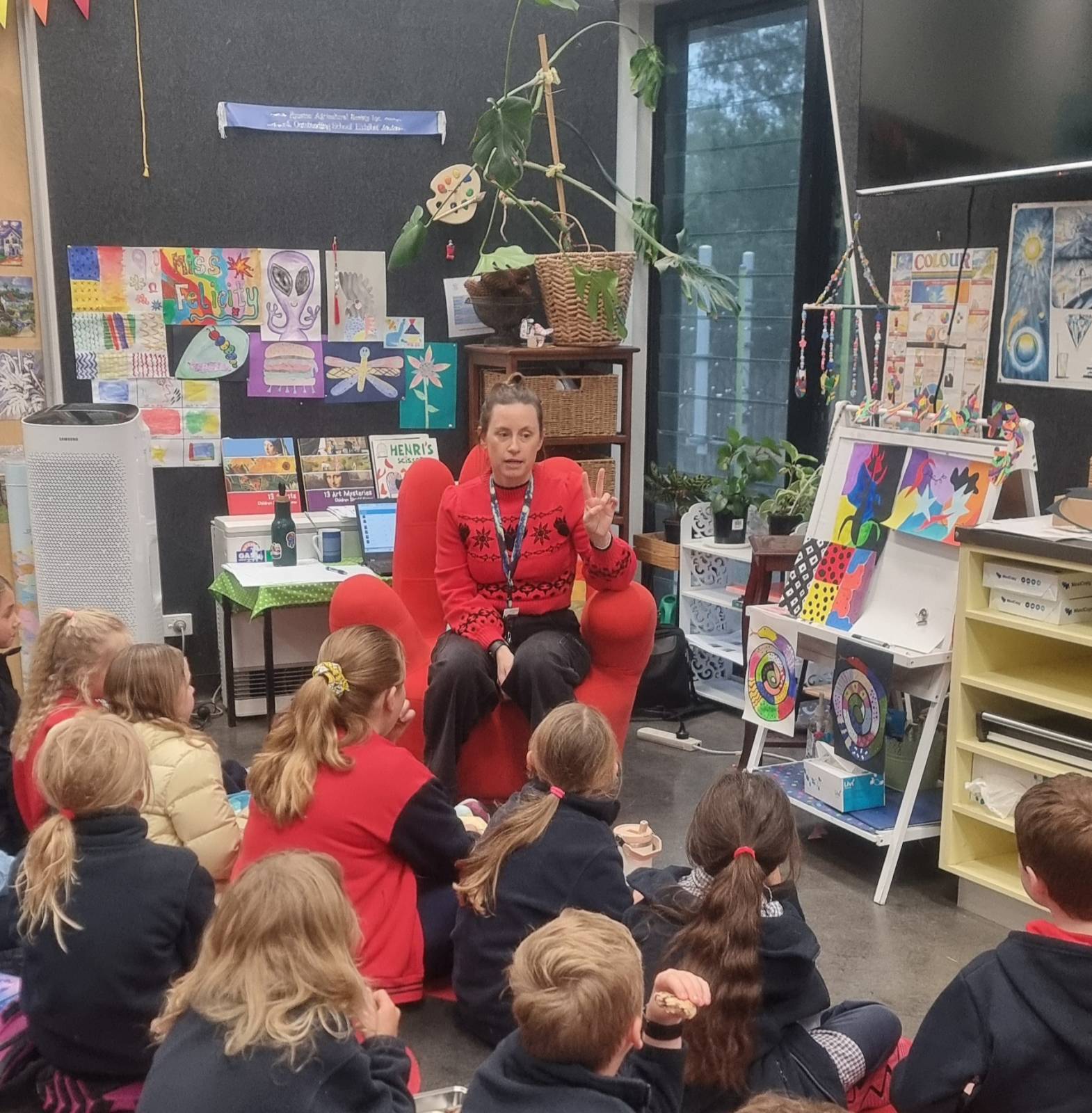
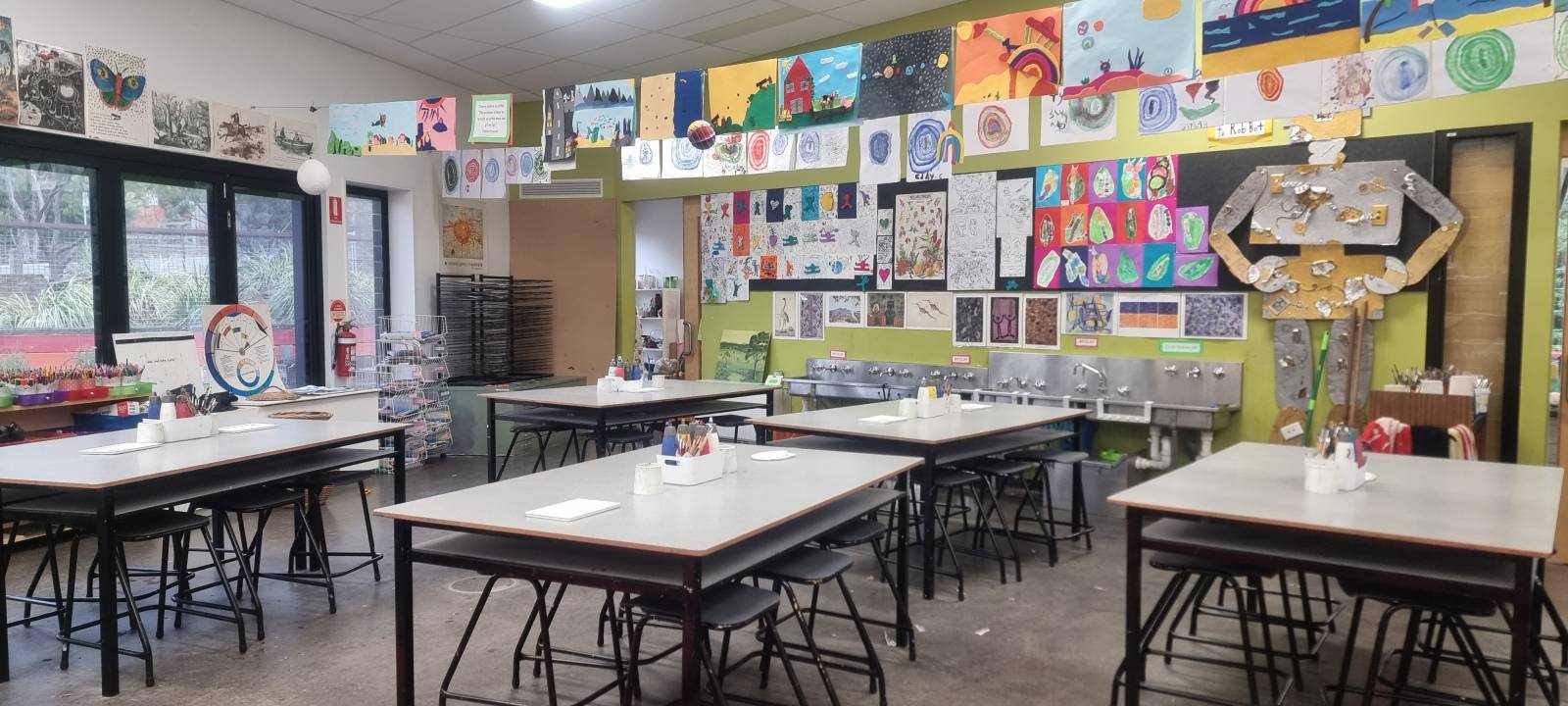
Physical Education
The Health and Physical Education Curriculum (P.E.) at Macedon Primary School provides opportunities for students to develop, enhance and exhibit attitudes that promote a healthy lifestyle through the development of skills, knowledge, team work and school values.
The children have opportunities to play, score, umpire and on occasions, coach younger students.
Our comprehensive program provides children with a wide range of physical and sporting experiences focusing on the sequential development of fundamental motor and locomotion skills, gymnastics, athletics, fitness and sport education.
To implement the P.E. program, we have access to excellent facilities including our JCB building, school oval, basketball/netball court and nearby Tony Clarke Reserve oval.
We also have an excellent range of equipment that ensures a variety of experiences for the students each session.
Our specialist Physical Education teachers lead skill based P.E. programs with Foundation-Year 6 children each week.
Children in the junior school will learn and practice the correct techniques for running, hopping, jumping, skipping, catching, throwing, kicking, rolling, balancing, twisting and turning.
Children in the middle and senior school will develop the capacity to link these skills into more complex and coordinated movement sequences. As students develop increasingly complex motor skills, they will be given opportunities to then apply these to appropriately modified games and sport-specific settings.
A strong emphasis is put on our school vales of respect, responsibility, integrity and being inclusive during our P.E. sessions.


Wellbeing
Mental Health in Primary School (MHiPS) Initiative
In 2025, Macedon Primary School is excited to begin implementing the Department of Educations’s Mental Health in Primary Schools (MHiPS) initiative. This important program recognises the vital role schools play in supporting the mental healthy and wellbeing of children.
The initative will be led at our school by Sue Erwin, who will take on the role of Mental Health and Wellbeing Leader. Sue will work closely with staff, students, and families using the MHiPS Jigsaw Framework, which outlines six key areas of focus; promoting student wellbeing, early intervention, targeted support, student voice, family engagement, and creating safe and inclusive learning environments.
By using this evidence-based approach, Sue will help ensure that wellbeing is embedded in all aspects of school life, supporting every child to thrive socially, emotionally, and academically.
We look forward to working in partnership with our community to strengthen our whole-school approach to mental health and wellbeing.
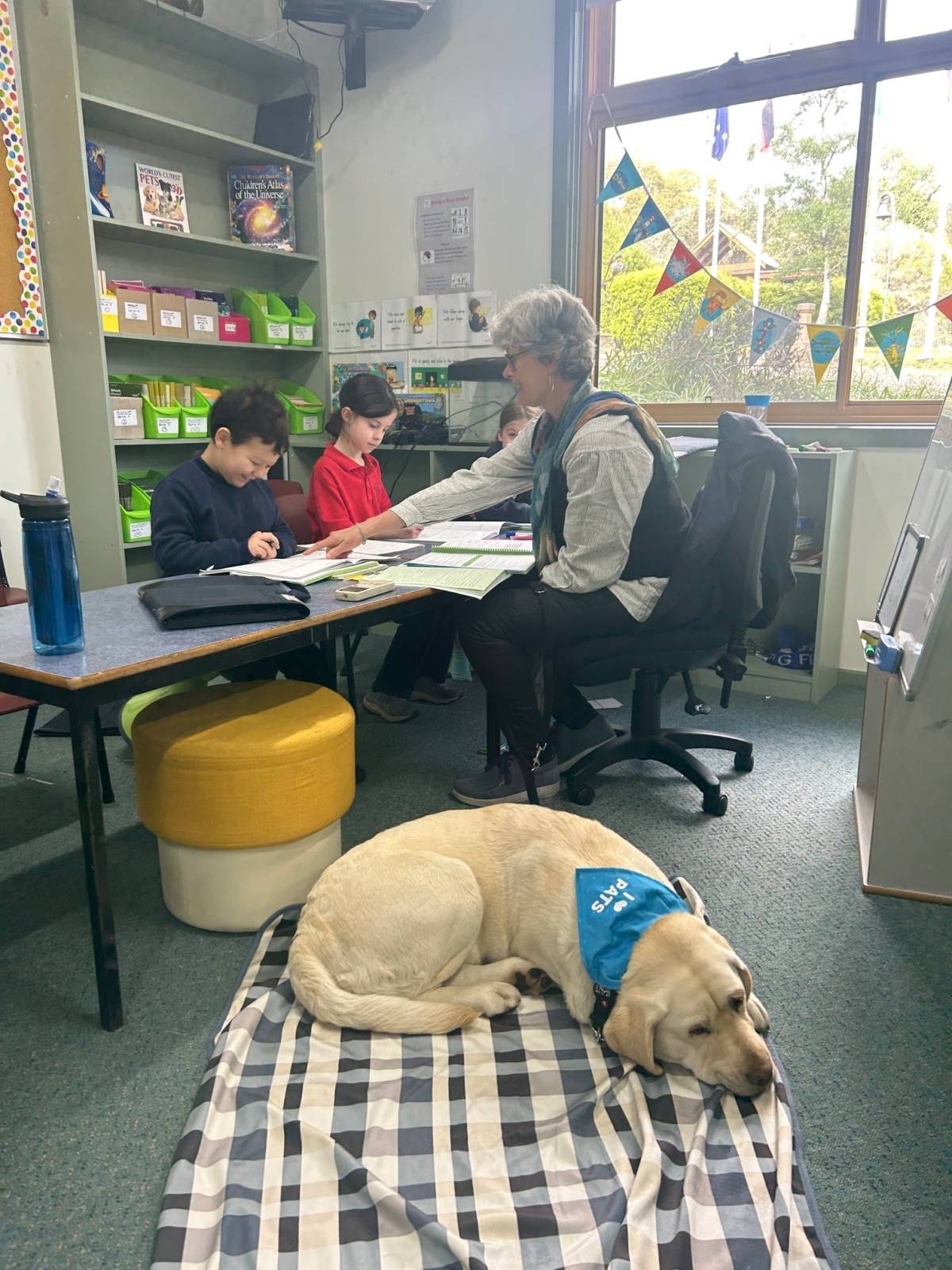
STEM
At Macedon Primary School, we are proud to offer a dynamic and engaging STEM (Science, Technology, Engineering and Mathematics) program that inspires curiosity, creativity, and critical thinking in our students.
Our dedicated STEM teacher runs an outstanding program that caters to all year levels from Foundation through to Grade 6. They create hands-on, inquiry based learning experiences that encourage students to explore real life problems, collaborate with others, and develop innovative solutions.
From designing and testing structures, to coding, robotics, scientific investigations, and environmental projects, our STEM program equips students with the skills they need to thrive in a repidly changing world.
Our STEM teachers passion and expertise make STEM a highlight of the week for many of our students, sparking a love of learning and discovery across all year levels.
Forest School
At Macedon Primary School, students participate in Forest School each week, making the most of our beautiful natural surroundings to support learning beyond the classroom.
Forest School is a unique program that combines biological science and outdoor education, encouraging students to study the environment and connect deeply with the world around them.
Through hands-on, inquiry-based experiences, students explore local eco-systems, observe seasonal changes, and develop practical skills they can use in nature – such as building shelters, identifying native plants and animals, and using natural resources responsibly.
The program is led by Lisa, a dedicated teacher with a strong passion for the environment. Lisa brings energy, knowledge and care to every session, nurturing students’ sense of wonder, resilience, and environmental stewardship.
Forest School is a treasured part of the Macedon PS experience – supporting students wellbeing, fostering curiosity, and helping students develop a lifelong appreciation for the natural world.
